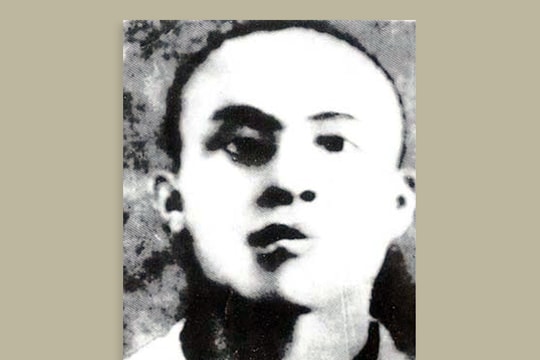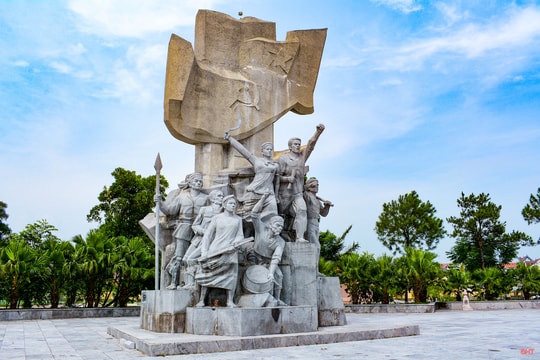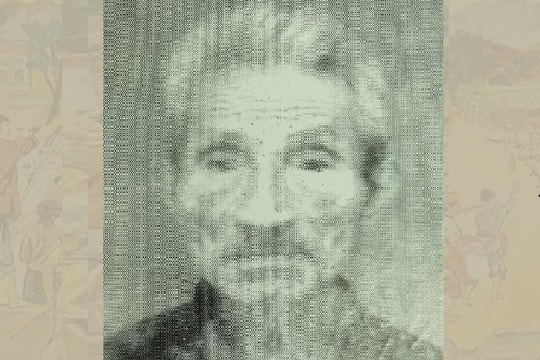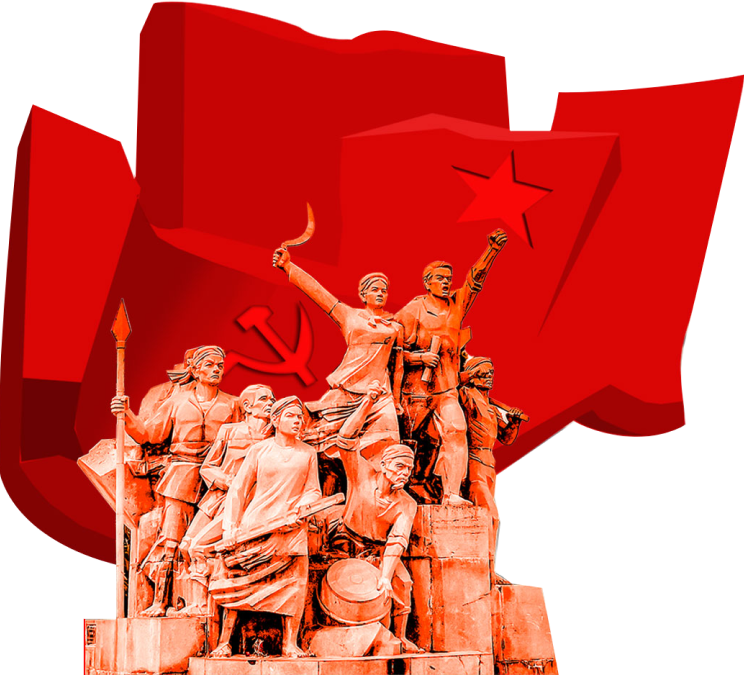Comrade Sieu Hai (1915-1939): Devoted his entire youth to the patriotic and revolutionary movement
Sieu Hai (real name Nguyen Nhat Tan) passed away at the age of only 24, but his life and revolutionary career wrote the most beautiful golden pages of history...
In August 1938, the French Secret Service in Vinh found the book "The Disaster of War and the Defense of Indochina" (Book published in July 1938, Tien Bo Publishing House - Vinh), authored by Sieu Hai, so they knew that Sieu Hai was a formidable communist intellectual; therefore, they tried their best to hunt him down.
Actually, Sieu Hai is the pen name of Nguyen Nhat Tan, a talented young speaker whom they had known before. At that time, Sieu Hai was operating right in Vinh - Ben Thuy.
Sieu Hai was born in 1915, with the birth name Nguyen Dinh Hoanh. His hometown is Yen Tho village, Phu Long commune (now Hung Long commune), Hung Nguyen district, Nghe An province. Sieu Hai's family, both paternal and maternal, has a tradition of patriotism. His maternal grandfather participated in the Van Than movement against French colonialism.
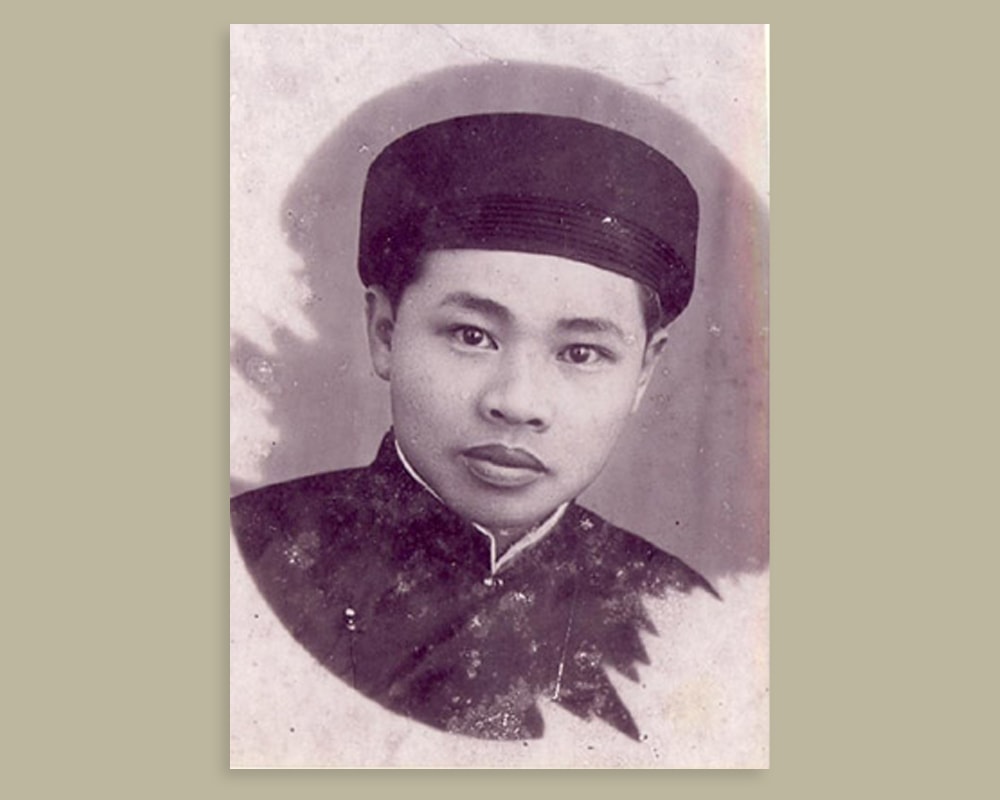
Nguyen Dinh Hoanh's father, Nguyen Dinh Loc, was a poor teacher with a straightforward temperament and hated the Confucianists and the sycophants. He once denounced the evils of offering meat and sticky rice at the village temple and was beaten by a group of local officials. The sword-shaped scar on his head always reminded him of his deep hatred for the corrupt people. He received famous patriots such as Phan Boi Chau, Dang Thai Than, Giai Huan, Co Lua... at his home. Mrs. Nguyen Thi Thanh (Uncle Ho's sister) and Mr. Ca Khiem (Uncle Ho's brother) often visited his home to plan for national salvation. He was a member of the Duy Tan Association and many times, together with Mr. Vuong Thuc Oanh, took young people to Dang Thuc Hua's Plowing Camp in Siam.
Mr. Nguyen Dinh Loc fell ill and died on the way to help people go abroad. At that time, Sieu Hai was only 11 years old (and had lost his mother since he was 3).
Sieu Hai had no support from his paternal side because his two paternal uncles were so poor that they had to sell their children to Chinese capitalists. He was raised by his maternal grandmother and sent to study at Vinh National School. Sieu Hai was very intelligent. His knowledge did not stop at the general curriculum because he was very passionate about reading books and newspapers, especially political and social books and newspapers. Progressive books and newspapers at that time helped him understand many complicated issues in daily life. The more he understood, the more he understood the humiliation of losing the country that Phan Boi Chau wrote in Overseas Blood Letter:
He sees himself as a dog or a buffalo.
It sees itself as grass and straw.
He was very moved by the passionate appeal of the patriot Phan:
Cast iron liver to move mountains and fill seas
Hot blood washes away the stain of slavery
(Phan Boi Chau - New Year's song for youth)
Enlightened by his seniors about revolutionary ideals, Sieu Hai participated in revolutionary activities since his teenage years. He worked as a liaison for the Tan Viet organization in Vinh - Ben Thuy. Here, in the years 1927-1928, the Vietnam Revolutionary Youth Association and Tan Viet were very active. Sieu Hai joined the Student Association of Tan Viet and actively participated in the Vinh - Ben Thuy student movement. He was in the same group with Ms. Quang Thai (the younger sister of Ms. Nguyen Thi Minh Khai, who later married Vo Nguyen Giap).
Sieu Hai's group enthusiastically participated in the struggle against the French colonialists transferring teacher Ha Huy Tap to teach in the mountainous areas (with the intention of preventing his revolutionary activities in Vinh). Also around that time, Sieu Hai's older sister, Nguyen Thi Nhuan, became one of the core members of the youth movement in Vinh - Ben Thuy. The two sisters often appeared in the heated struggles through the movements to mourn Phan Chu Trinh and demand the exoneration of Phan Boi Chau.
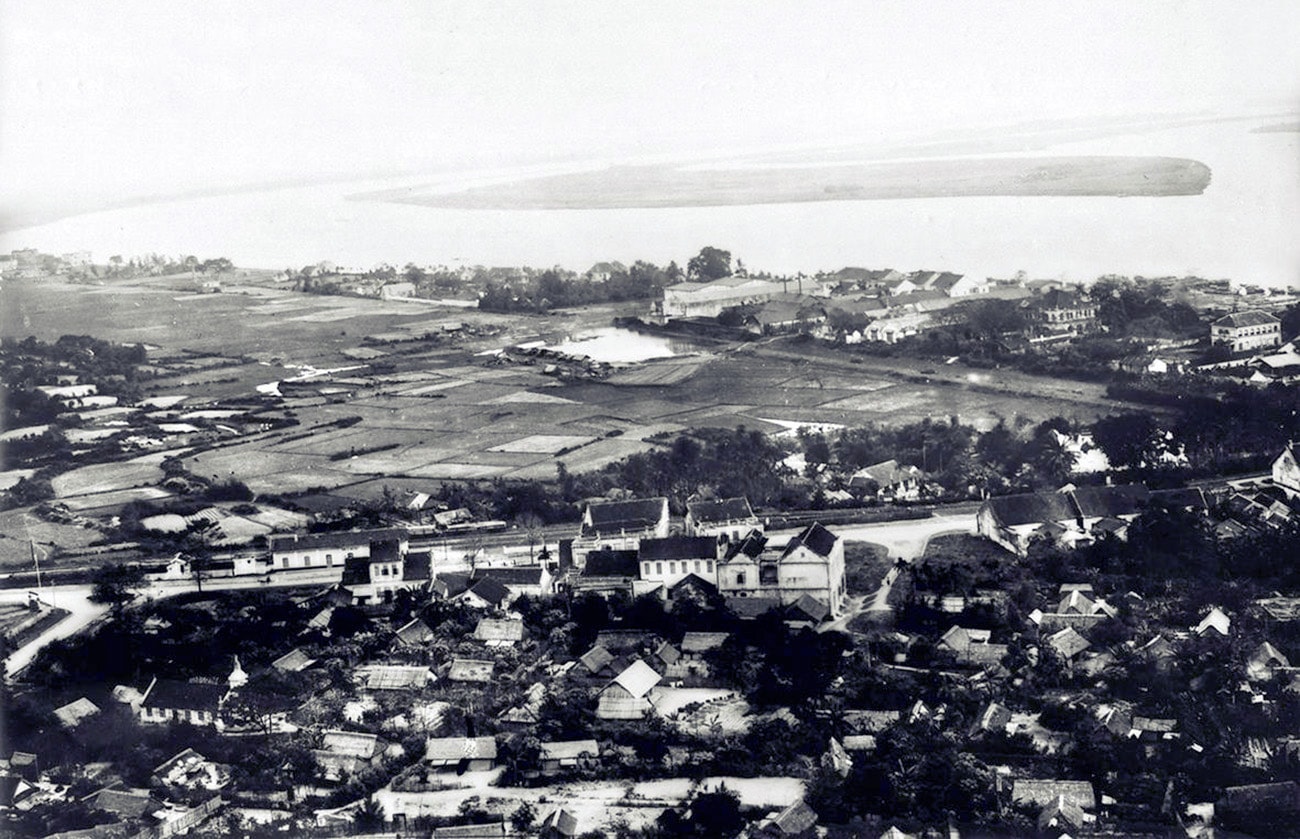
At the end of 1929, Sieu Hai was transferred to the Communist Party of Indochina's Student Association. After the Vinh National School students' strike, he was expelled from school along with a number of friends whose names were on the French secret police's blacklist. That year, Sieu Hai was in the middle of the third grade.
Returning to his hometown, he lived in harmony with the villagers, taught privately and liaised with the local Party organization. He was assigned to be in charge of the printing work of the Hung Nguyen Party Committee. Sieu Hai's alias at that time was Trinh.
In September 1930, the revolutionary movement in Nghe Tinh reached its peak. Following large-scale demonstrations with rudimentary weapons in Nam Dan district (August 30, 1930), Thanh Chuong (September 1, 1930), Can Loc (September 7, 1930)... on September 12, 1930, the Hung Nguyen demonstration broke out. Although only 15 years old, Sieu Hai enthusiastically participated in this historic demonstration. The French Empire bombed the masses, killing and injuring many people.
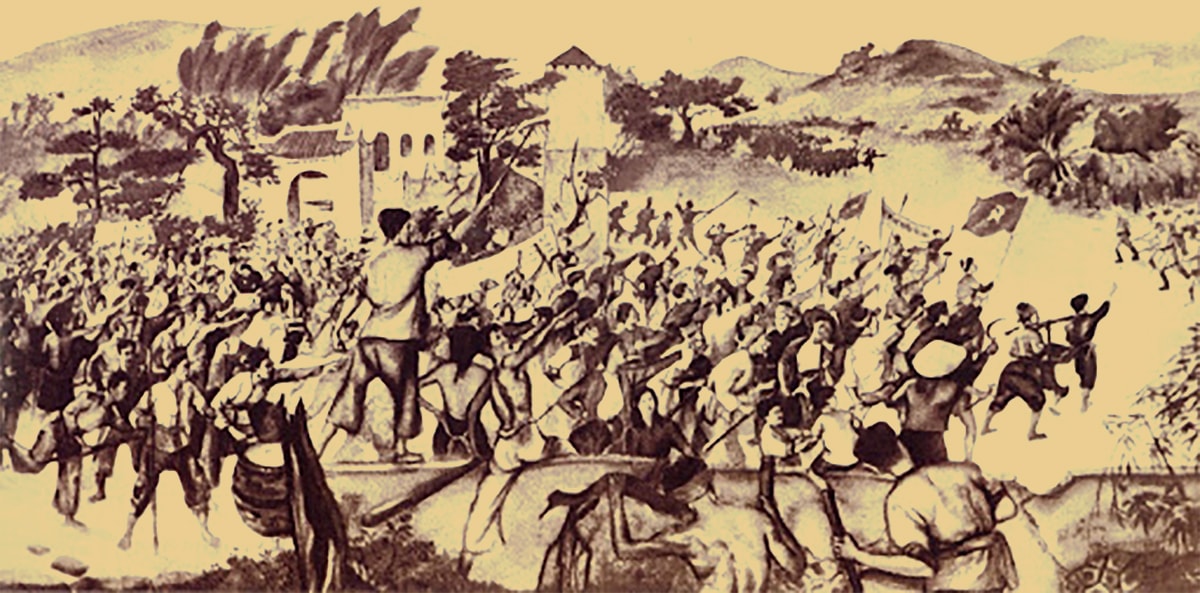
After that, they surrounded and hunted down cadres and party members. Sieu Hai went to a house next to the road, but they discovered him and tied him up, taking him to Vinh Prison. Seeing that Sieu Hai was still young, they tried to coax him to get secrets surrounding the demonstration and revolutionary bases in Hung Nguyen. When the coaxing failed, they threatened and tortured him until he could not walk. Before and after, Sieu Hai only answered: "I am still young, I only know how to study and play." That statement made them confused and embarrassed, because he was not yet a teenager.
From Vinh Prison to the Secret Service was not far, but because Sieu Hai was exhausted, many days the soldiers had to carry him out, and after interrogating him, they carried him back. He interacted with the soldiers and enlightened them. There were also kind soldiers who knew how to take care of and help Sieu Hai when he was beaten. When Vinh Prison was full of political prisoners, the French colonialists transferred Sieu Hai to Quang Tri Prison. After nearly a year of imprisoning Sieu Hai, they still did not have enough evidence to convict him. In the end, they had to release that brave young man.
The harsh life in prison, with the enemy's brutal beatings, damaged Sieu Hai's health. However, he still tried to contact the remaining revolutionary bases after the earth-shaking battles of 1930-1931. The revolutionary movement situation in the whole country in general and Nghe Tinh in particular around the end of 1931 and the beginning of 1932 was very difficult. Party bases were broken up in many places. Activities at that time were very dangerous because the enemy's secret police and military posts were dense. Many comrades were killed and imprisoned. Despite this, Sieu Hai still wholeheartedly worshiped the communist ideal and firmly believed in the existence and development of the Indochinese Communist Party. Overcoming all difficulties and dangers, he rushed in and out to establish contact with the Party.
In early 1932, Sieu Hai met Nguyen Xuan Linh and several other comrades to re-establish the Vinh Regional Party Committee. He was assigned to meetLe Xuan Dao(aka Chat Lu) to contribute to rebuilding the Central Region Party Committee. Unfortunately, before he could meet Le Xuan Dao, Sieu Hai was captured by the enemy. That year, Sieu Hai was only 17 years old, but had been imprisoned twice. This time, the French colonialists used more sinister and cruel tricks than before. They brought out a photo of Le Xuan Dao to force him to identify him. Seeing the portrait of the comrade he had always admired, Sieu Hai was very emotional, but he still calmly replied: "I have never seen this person's face."
Using tricks on Sieu Hai was ineffective, the enemy tortured him with modern tools such as electric shock, burning his hands with alcohol lamps, "submarines"... Sieu Hai still kept a calm face, not a single groan and did not reveal anything about the Party's secrets. The French colonialists sentenced Sieu Hai to 13 years of hard labor and sent him to Trieu Duong prison, a remote and poisonous place in Anh Son district.
It was not until 1936, when the Popular Front came to power in France and a movement arose throughout our country to demand the release of political prisoners, that Sieu Hai was released. At only 21 years old, he could no longer walk steadily, because the harsh regime of the imperial prison had left his body emaciated, one leg paralyzed, and his digestive tract frequently bleeding. He often had to fast for several meals to relieve the pain. However, Sieu Hai rarely left his books and was always worried about the general movement.
From the beginning of 1937 onwards, when the Indochinese Democratic Front movement was at its height, many public books and newspapers of the Party, the Democratic Front and the Democratic Youth Union were published, both in Vietnamese and French. Newspapers such as “Dan chung”, “Doi nay”, “Tin tuc”, (Rassemblement), “Notre voix” (Our Voice)..., the book “Van de dan tuc” (The Peasant Problem) by Qua Ninh and Van Dinh (Truong Chinh and Vo Nguyen Giap), and To Huu’s poetry appeared with verses full of fighting spirit and revolutionary optimism:
From then on, the summer sun was shining in me,
The sun of truth shines through the heart!
My soul is a garden of flowers and leaves,
Very fragrant and full of birdsong!
In addition, the classic works of Marxism-Leninism that Sieu Hai always dreamed of or only read hastily and in fragments, are now freely studied. It is a spiritual food that Sieu Hai treasures, as necessary as food, water, and air to breathe. Equipped with the theoretical weapon of Marxism-Leninism, Sieu Hai again tries to use his sharp pen to fight on the cultural and political front.
Sieu Hai has painstakingly re-edited the novel “Giọt Huyền Hồng” written by comrades Ho Tung Mau, Nguyen Duy Trinh... and passed down orally in prison. The novel “Giọt Huyền Hồng” praises the qualities of a communist party member who is absolutely loyal to his ideals throughout his life, even if he is misunderstood for a moment, but he does not lose heart.
Sieu Hai also wrote “The Orphan” and “Whom I Am for” to denounce the exploitation and oppression of the working class by the imperialists and feudalists. The above three works were not published but were secretly circulated among cadres, party members and youth in Vinh - Ben Thuy.
The book “The Disaster of War and the Defense of Indochina” was published in July 1938. In this book, Sieu Hai correctly expressed our Party’s policy on the defense of Indochina. He highlighted active defense measures such as: improving the people’s living standards; improving military activities; promulgating freedom and democracy for the people; providing military training for the people; fighting against the pro-Japanese and the Trotskyists, etc.
Many passages in the book demonstrated the high fighting spirit of a communist party member. Sieu Hai used "his own petard to beat his own back", using the propaganda for the defense of Indochina to expose the tricks of colonial reactionaries and demand that the current government fulfill the demands of the masses.
He wrote:“For the past two years, since the victory of the French Popular Front, the Blum and Chautemps governments have taken power, and have implemented a somewhat lenient policy to comfort the people and to ease their suffering, but the repressive policy has not been completely reduced; simple democratic freedoms have not been promulgated, progressive newspapers are still banned and confiscated in large numbers, people's soldiers are still arrested and imprisoned, the voting system has not been expanded, but in the North it has been narrowed, and the tax reform has been aimed heavily at the petty bourgeoisie. Some of the government's reforms, when implemented for the people, were narrowed and manipulated by reactionaries...”.
The author does not forget to expose the Trotskyites and the pro-Japanese:“The reactionaries and their henchmen, the Trotskyites, immediately took advantage of the people's suspicion, tried to defame the Popular Front and propagated the tactic of "revolutionary failure" once war broke out, to bring the fascists to power. In addition to the Trotskyites who called for "revolutionary failure" to help the fascists, there was another group with a pro-Japanese mindset who also praised and encouraged the powerful prestige of Japan. These people were partly a group of hateful writers who were losing their position on the path of failure, hoping to sell out Indochina to enjoy glory and wealth...”.
At the end of the book's conclusion, Sieu Hai still aimed at his target to shoot the final shot:“The people of Indochina have experienced the sweet promises of Albert-Sarraut during the European War. Today, they do not believe in sweet lies, they only believe in solid work.
Now it's serious!
What is the government waiting for to satisfy their demands to increase the defense force of this country?
While taking advantage of every moment to write the above valuable documents, Sieu Hai and other comrades still organized the Democratic Youth Union in Vinh - Ben Thuy. He was appointed as Secretary. The secret police closely monitored Sieu Hai's activities. They infiltrated the Democratic Youth Union meeting in the Truong Thi worker village to watch Sieu Hai give a speech on the issue "Who is the real owner of the factory?". They immediately reported to the Vinh Secret Police Department. Ombe (Humbert), Chief Secret Police immediately reported to Ambassador Marty about the background of Nguyen Nhat Tan, aka Sieu Hai, with his criminal record from 1930.
To deceive the enemy, the organization arranged for Sieu Hai to pose as a reporter for the "Dan" newspaper in Central Vietnam. From a very simple person, often wearing brown clothes, wooden clogs, and a conical hat, Sieu Hai disguised himself as a "young master", wearing a suit and a belt. His fair skin, slightly slanted, bright eyes further gave him the appearance of an intellectual at that time.
For the revolutionary movement in Vinh - Ben Thuy in the period of 1936-1939, Sieu Hai made many significant contributions. He was a member of the Vinh City Party Committee Standing Committee, in charge of propaganda and the Youth Union. He was very interested in the women's movement. Women considered Sieu Hai an indispensable advisor. He carefully instructed them on how to organize meetings and demonstrations, especially how to combine legal and semi-legal public struggles. Sieu Hai often gave speeches in crowded places with workers such as docks, factories, worker neighborhoods... His arguments were clear, easy to understand, and suitable for all classes. Moreover, his gentle, modest, and lively nature was loved by the masses, so his voice was even more persuasive. Sieu Hai was well versed in the law and knew many of the enemy's tricks, so he was very flexible in dealing with them.
It can be said that Sieu Hai did everything he could for the Democratic Front movement in Vinh - Ben Thuy at that time. From a petition sent to the consul demanding freedom, democracy, equality, and women's rights, to an article in memory of a fallen comrade... Sieu Hai wrote it with all his enthusiasm and intelligence.
Sieu Hai set a shining example of revolutionary ethics and fighting spirit (including fighting his own illness) for the youth in Vinh - Ben Thuy at that time to learn from. Sieu Hai believed that: Family happiness can never be separated from the common happiness of society. For him, a family in a semi-feudal colonial regime cannot have complete happiness, that family "cannot rely on" because society was so rotten that it was "difficult to stand or sit".
We can find those thoughts of Sieu Hai in his poems:
A hundred years of fate is enough
What a husband and children, what a thorny life!
Such a family is difficult to rely on,
Society seems to be difficult to stand or sit!
The willow tree is always striving,
Don't be in danger, try to swim,
What hero is without a worthy partner?
"Gold and stone deeply engraved send a few words".
That is the poem Sieu Hai wrote in prison to send to his sister Nguyen Thi Nhuan, when she was having trouble in love.
In a wedding poem, Sieu Hai also did not forget to convey his feelings and encourage the newlyweds to maintain their fighting spirit:
"Family happiness please think
Social benefits are determined to succeed.
On the road of struggle, he is with her.
In the midst of the movement, she had him.
Grasp firmly the victory of "ca em" (revolution)
I celebrate your sacrifice!
After discovering that Sieu Hai, the author of the book “The Disaster of War and the Defense of Indochina” was Nguyen Nhat Tan, the secret police were surprised to see that the “stubborn” boy had soon become a communist politician with sharp theoretical knowledge. Chief secret police Om be called Sieu Hai up to threaten him:
- The protectorate does not accept your anti-government actions.
Sieu Hai loudly replied:
- Because the French used fake tricks to deceive people, I had to tell the truth!
The enemy did not arrest Sieu Hai immediately because they wanted to have solid evidence to charge him with a heavy sentence. They surrounded him many times, but thanks to the protection of workers and poor farmers in the city, he escaped every time. The old fox Om Be accused Sieu Hai of three crimes: disturbing public order, writing anti-government articles, and committing many other acts of sabotage. With that as an excuse, they brazenly arrested Sieu Hai at his private home.
Having been in prison twice, this third time Sieu Hai has more experience in dealing with enemies. They must be afraid of Sieu Hai's endurance and are very afraid of his sharp words. They are afraid of the truth, and he always exposes their dirty truths. There is a British proverb: "All truths are hard and strong."
The news of Sieu Hai's arrest quickly spread throughout the city. Immediately, the masses submitted a petition demanding the government release Sieu Hai. Faced with such unexpectedly strong resistance, the ambassador, Mac Ty, had to order Om Be to release Sieu Hai. Before releasing him, they cruelly beat him to death.
Due to brutal torture, after a short time of working, Sieu Hai became very ill. Vinh City Party Committee asked a doctor who sympathized with the revolution to save Sieu Hai. In July 1939, he was taken to Vinh Hospital. Sieu Hai was taken care of attentively and thoughtfully by his compatriots and comrades in Vinh - Ben Thuy. Although it was very difficult to visit communist patients like Sieu Hai, there was almost always someone present at his bedside. Even when the hospital was closing time, people climbed over the wall to take care of him. Sieu Hai was always interested in the general movement. When he was unconscious, he would talk about current events and exchange work experiences with his friends.
He had to have surgery to remove the severely inflamed intestine. After overcoming that dangerous surgery, everyone thought he would gradually get better. Unexpectedly, he suddenly said goodbye to everyone! At that time, he was only 24 years old! Sieu Hai's funeral was solemnly held on August 27, 1939 in Vinh - Ben Thuy city. It was one of the biggest funerals in our country at that time. Attending the funeral were mass representatives from districts in the two provinces of Nghe An and Ha Tinh. This funeral was also a demonstration of strength by tens of thousands of workers, farmers, intellectuals, and urban poor in Vinh - Ben Thuy and neighboring areas.
Unable to attend the funeral, political prisoners in Vinh Prison held a memorial service for the young communist soldier Sieu Hai. A comrade read a moving and heroic poem, which included the following passage:
"A thunderclap resounded, my heart was numb
The whole brain weighs the feelings of everyone
In the peaceful life of all species
Oh dear, lost a fighting arm!
I have known you twice in prison.
For the sake of power, he does not hesitate to rush into battle.
As long as you fight, you keep coming in and out.
Prison with arrogant smile!
Do you know me in the long, miserable night
The common people are enthusiastically rushing forward.
You are like a torch lighting the long road
Suddenly extinguished in the magical nothingness!
His body turned into the storm wind
Blow up the current regime
His spirit was flying everywhere
Give life to all living things!
Everywhere there is excitement and bustle
Deeply feel a sublime idea
The waves of spirit surged high.
You are not dead, you are still alive!
(The author of the eulogy is Trinh Van Quang, from Thanh Hoa)

